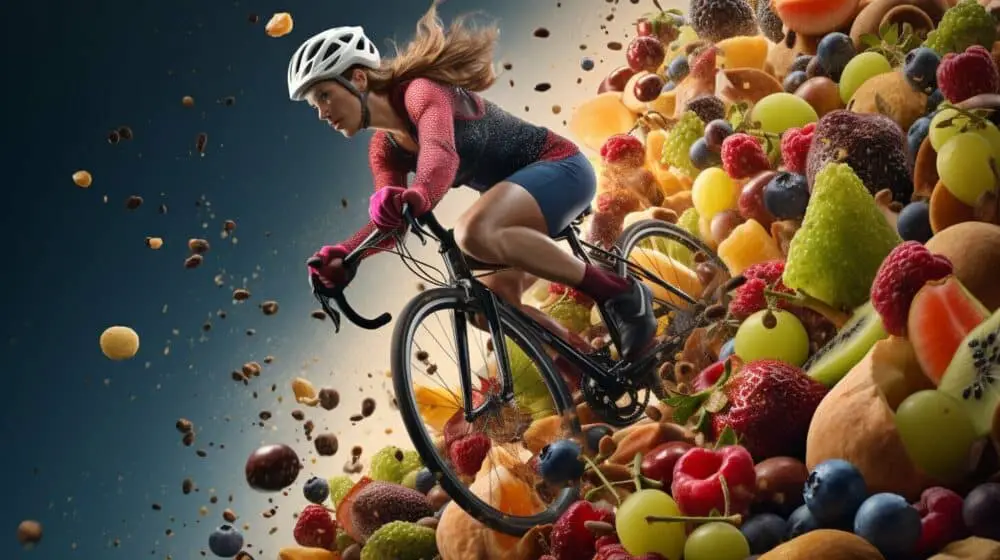As a professional cyclist, I know how essential proper nutrition is for race day performance. Without the right fuel, even the most well-trained cyclist can fall short of their potential. That’s why I want to share the best cycling race day nutrition tips to help you unlock your full potential on the bike.
Cycling nutrition isn’t just about consuming enough calories to keep you going. It’s about strategically fueling your body to optimize performance and sustain energy levels throughout the race. With the right nutrition plan, you’ll improve your stamina, reduce fatigue, and enhance your overall performance.
Key Takeaways:
- Proper nutrition is essential for cycling race day performance
- The right fueling strategies can improve stamina and reduce fatigue
- Optimizing energy levels with the right nutrition plan can enhance overall performance
The Role of Carbohydrates in Cycling Nutrition
As a cyclist, I understand the importance of proper nutrition for optimal performance on race day. One of the most critical macronutrients for cycling nutrition is carbohydrates. They are the primary source of energy for cycling, supplying the body with glycogen to fuel intense exercise. Maintaining adequate glycogen stores is crucial to performance, as it allows for sustained energy levels throughout the race.
When it comes to carbohydrate intake, body weight plays a significant role. As a rule of thumb, it is recommended to consume 6 to 10 grams of carbohydrates per kilogram of body weight per day. For endurance cyclists, it is crucial to consume enough carbohydrates to replenish muscle glycogen stores before and during the race.
Incorporating complex carbohydrates into your diet is also essential for sustained energy levels during a race. Unlike simple carbohydrates, which are quickly digested and provide a short burst of energy, complex carbohydrates are broken down slowly, providing a steady stream of energy throughout the race.
| Carbohydrate type | Examples |
|---|---|
| Simple | Sugar, candy, honey, jam |
| Complex | Whole grains, brown rice, quinoa, sweet potatoes |
Carbohydrates are the foundation of any solid cycling nutrition plan. Incorporating the right type and amount of carbohydrates can help cyclists unlock their full potential and achieve their race day goals.
The Importance of Glycogen Stores
Glycogen stores are an essential part of race day nutrition. They are the body’s storage form of glucose, which is used for energy during prolonged exercise. When muscle glycogen stores become depleted during a race, cyclists may experience fatigue, decreased power output, and an inability to sustain high-intensity efforts.
To optimize performance, it is recommended to consume enough carbohydrates during training and on race day to replenish glycogen stores. The amount of carbohydrates needed can vary depending on the individual and the length of the race.
Summary
Carbohydrates play a crucial role in cycling nutrition. They are the primary source of energy for cycling, and maintaining adequate glycogen stores is essential for sustained energy levels during a race. Incorporating complex carbohydrates into your diet is also crucial for sustained energy levels during the race. By understanding the role of carbohydrates in cycling, cyclists can optimize their performance and achieve their race day goals.
Pre-Race Nutrition Strategies
As a cyclist, it’s essential to fuel your body with the right nutrients before a race to optimize performance. Solid foods and carbohydrate drinks are great options to consider, as they provide the necessary energy to power through the race. Here’s an example cycling nutrition plan to guide your pre-race nutrition:
| Meal | Food/Drink | Timing |
|---|---|---|
| Breakfast | Oatmeal with sliced banana and almond butter | 3 hours before race |
| Snack | Banana and peanut butter sandwich on whole wheat bread | 2 hours before race |
| Pre-race hydration | Carbohydrate drink | 30 minutes before race |
Carb loading is another technique to consider. It involves increasing your intake of carbohydrates a few days before the race to top off muscle glycogen stores. This can help delay fatigue during the race. However, it’s important to note that carb loading doesn’t mean consuming all the carbs. Instead, aim for a slight increase in carbohydrate intake while maintaining a balanced diet.
Overall, a combination of solid foods, carbohydrate drinks, and a potential carb load can help you optimize your nutrition before a race. Fuel up smartly to ensure your muscles have the necessary energy to perform at their best.
During-Race Fueling Techniques
Proper fueling during a race is crucial for maintaining energy levels and performing at your best. Here are some of the best options for race day nutrition:
| Option | Description |
|---|---|
| Energy gel | An easily digestible option that delivers a quick burst of energy. Take one to two gels per hour, consuming with water to avoid upset stomachs. |
| Energy bar | A more substantial option that can provide sustained energy. Look for bars with complex carbohydrates, fiber, and protein. Aim to consume one bar per hour, with water. |
| Sports drink | A great way to replenish electrolytes and carbohydrates lost during exercise. Look for drinks with sodium and potassium for optimal hydration. Aim to consume one to two cups per hour. |
It’s important to consume carbohydrates during a race to maintain energy levels. Aim for 30 to 60 grams of carbohydrate per hour, depending on your body weight and exertion level. Cycling nutrition products, such as energy bars and gels, can make it easy to consume the right amount of carbohydrates.
In addition to these options, it’s important to consider proper bike nutrition. This can include attaching a small bag to your bike with snacks, such as bananas or dried fruit, to consume during the race. Just be sure to practice eating on the bike during training rides to avoid any surprises on race day.
Post-Ride Nutrition for Recovery
As an endurance athlete, I know the importance of post ride cycling nutrition for optimal recovery. After pushing my body to its limits on a race day, it’s crucial to refuel with the right food and drink to aid in recovery and prevent injury. Below are some key considerations for post-ride nutrition:
| Nutrition Strategy | Details |
|---|---|
| Lean Protein | Consuming lean protein is key to repairing and rebuilding muscle tissue after a strenuous race. Examples of lean protein include grilled chicken, fish, and tofu. Aim for at least 20 grams of protein per meal. |
| Replenishing Electrolytes | Sweating during a race can cause an imbalance of electrolytes in the body, leading to dehydration and muscle cramps. It’s important to replenish these essential minerals by drinking electrolyte drinks or consuming foods rich in electrolytes, such as bananas and avocadoes. |
| Body Mass | Your body mass plays a significant role in determining your post-ride nutrition needs. It’s important to calculate your calorie needs based on your weight, activity level, and race intensity. Consult with a sports nutritionist if necessary to develop a personalized plan. |
By following these post ride cycling nutrition guidelines, you can help your body recover more quickly and get back on the bike sooner. Remember to prioritize recovery just as much as your training sessions to achieve your racing goals.
Homemade Nutrition Options
As a cyclist, I know how important it is to have a solid nutrition strategy for race day. While there are many cycling nutrition products available in the market, sometimes it’s nice to have a homemade option that you know exactly what’s in it. One of my go-to homemade snacks is rice bars.
Rice bars are a great option because they are easy to make, transport, and consume before and during a race. Plus, they can be customized to your taste preferences and dietary needs. I like to add a variety of nuts, dried fruits, and protein powder to mine, but you can experiment with different ingredients to find what works best for you.
How to Make Homemade Rice Bars
To make rice bars, you will need:
| Ingredient | Measurement |
|---|---|
| Uncooked white rice | 1 cup |
| Water | 2 cups |
| Honey | 1/4 cup |
| Nuts (almonds, walnuts, pecans, etc.) | 1/4 cup |
| Dried fruit (raisins, cranberries, apricots, etc.) | 1/4 cup |
| Protein powder (optional) | 1 scoop |
Note: Feel free to adjust measurements based on personal preference and dietary needs.
To make the bars:
- Cook the rice according to package instructions.
- In a large mixing bowl, combine the cooked rice, honey, nuts, and dried fruit.
- Add protein powder (if using) and mix until well combined.
- Spread the mixture evenly into a 9×9 inch baking dish lined with parchment paper.
- Refrigerate for at least an hour.
- Remove from the refrigerator and cut into bars.
Another important aspect of race day nutrition is avoiding fried foods and instead opting for a substantial, balanced meal that will provide sustained energy. This could include lean protein, complex carbohydrates, and vegetables. By prioritizing your nutrition on race day, you’ll be setting yourself up for success and unlocking your full potential on the bike.
Cycling Nutrition Products
When it comes to fueling your body for a cycling race, there are a plethora of cycling nutrition products available on the market. Whether you’re looking for sports nutrition bars, sports drinks, energy bars, or drink mixes, there’s something out there for everyone.
Sports nutrition bars are a popular choice among cyclists as they provide a convenient and easily portable source of energy. These bars typically contain a mix of carbohydrates, protein, and fat and come in a variety of flavors. However, it’s important to note that not all sports nutrition bars are created equal, and some may contain more sugar or artificial ingredients than others. So, be sure to read the labels carefully and choose a product that fits your specific needs.
Sports drinks are another popular option for fueling during a cycling race. They typically contain a mix of carbohydrates and electrolytes and are designed to provide quick energy and hydration. Some sports drinks even contain caffeine for an extra boost. Again, it’s important to read the labels carefully and choose a product that fits your specific needs.
Energy bars are similar to sports nutrition bars but are typically higher in carbohydrates and lower in protein and fat. They’re designed to provide a quick and convenient source of energy during a race. Like sports nutrition bars, it’s essential to read the labels and choose a product that fits your specific needs.
Drink mixes are an excellent option for cyclists who prefer to mix their own fuel during a race. These mixes typically contain a combination of carbohydrates and electrolytes and can be easily added to your water bottle. They come in a variety of flavors and can be a convenient and affordable option for fueling during a race.
When it comes to choosing the right cycling nutrition product, it’s essential to consider your unique needs and preferences. Experiment with different products during your training rides to determine what works best for you and your body. Remember to pay close attention to your body’s signals and adjust your nutrition plan as needed to ensure that you’re performing at your best.
The Importance of Carb Loading and Hydration in Cycling
Carbohydrates are the primary fuel source for cycling performance, and proper carb loading can significantly impact performance on race day. During training sessions, I prioritize carb loading to ensure my muscle glycogen stores are fully replenished before a race.
Using a power meter, I track my energy balance during training rides to ensure I maintain adequate fueling and avoid depletion. This not only optimizes performance but also aids in post-ride recovery. I also make sure to hydrate properly, consuming electrolyte drinks to replenish lost fluids and minerals.
Carb loading involves consuming a high-carbohydrate diet in the days leading up to a race, ensuring that your glycogen stores are topped off and ready to be used as fuel during the ride. It’s important to find the right balance of carbs and other nutrients to avoid feeling weighed down or sluggish on race day.
| Training Day Nutrition | Carb Loading Diet |
|---|---|
| Consume carbs throughout the day, aiming for roughly 30-60 grams per hour of training | Consume all the carbs! Aim for a high-carb diet, with roughly 10-12 grams of carbs per kilogram of body weight per day in the three days leading up to the race |
| Include other nutrients such as protein and healthy fats for sustained energy | Find the right balance of carbs, protein, and healthy fats to avoid feeling sluggish |
Hydration is also crucial for performance and recovery. I make sure to drink plenty of water and electrolyte drinks, particularly during hot or humid rides where dehydration can quickly set in.
Overall, balancing carb loading and hydration is essential for unlocking your potential on race day. By tracking energy balance and consuming the right nutrients, you can ensure that you have all the fuel you need to power through the ride and finish strong.
Conclusion
In conclusion, proper nutrition is crucial for unlocking your full potential on the bike. By implementing the strategies outlined in this article, you can optimize your race day performance and achieve your cycling goals. Remember, carbohydrates are the primary fuel source for cyclists, so it’s important to maintain glycogen stores and consume complex carbohydrates for sustained energy. Pre-race nutrition is also essential, and carb loading can have a significant impact on muscle glycogen stores. During the race, fueling techniques such as consuming energy gels, bars, and sports drinks can provide the necessary carbohydrates for energy. And post-ride nutrition, including lean protein and electrolyte replenishment, is essential for optimal recovery. Homemade nutrition options and cycling nutrition products can also be beneficial additions to your nutrition strategy. Finally, always remember the importance of carb loading and proper hydration. By prioritizing your race day nutrition, you can take your cycling performance to the next level. Happy cycling!
FAQ
Q: What is the role of carbohydrates in cycling nutrition?
A: Carbohydrates play a crucial role in fueling cycling performance. They help maintain glycogen stores and provide sustained energy during a race. Consuming complex carbohydrates is especially beneficial for long-lasting energy.
Q: What are some pre-race nutrition strategies?
A: Before a race, it is important to consume solid foods and carbohydrate drinks. A recommended cycling nutrition plan could include a mix of carbohydrates and protein. Carb loading can also help increase muscle glycogen stores.
Q: How should I fuel myself during a race?
A: During a race, it is recommended to consume energy gels, energy bars, and sports drinks to maintain energy levels. Aim to consume carbohydrates per hour to avoid bonking. Additionally, proper bike nutrition is essential for sustained performance.
Q: What should I eat for post-ride nutrition?
A: After a ride, focus on post-ride cycling nutrition to aid in recovery. Endurance athletes should prioritize consuming lean protein to support muscle repair. Replenishing electrolytes is also important. Consider your body mass when determining post-ride nutrition needs.
Q: What are some homemade nutrition options for cyclists?
A: Homemade rice bars can be a great nutrition strategy. They are easy to make and provide the necessary energy. Avoid fried foods and opt for a substantial, balanced meal before a race.
Q: What cycling nutrition products are available in the market?
A: There are various cycling nutrition products available, including sports nutrition bars, sports drinks, and energy bars. Consider the specific benefits of each product and choose the ones that suit your needs. A drink mix can also provide convenient on-the-go nutrition.
Q: Why is carb loading and hydration important in cycling?
A: Carb loading during training sessions can boost performance by increasing glycogen stores. Carbohydrates serve as the primary fuel source during cycling, and maintaining energy balance is crucial. Adequate hydration, including electrolyte drinks, is also essential for optimal performance.




